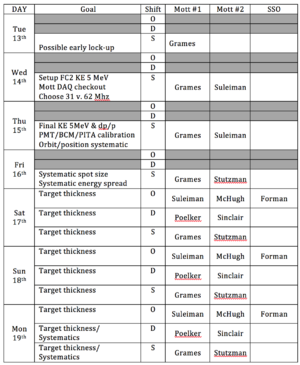Difference between revisions of "Run1 - January 2015"
Jump to navigation
Jump to search
| Line 1: | Line 1: | ||
= Shift Info = | = Shift Info = | ||
| + | |||
| + | == Please add here comments that should be read by everyone == | ||
== Contact == | == Contact == | ||
Revision as of 14:46, 12 January 2015
Shift Info
Please add here comments that should be read by everyone
Contact
Joe's cell : 757-344-0188
Schedule
Worker Responsibilities
- Beam Driver = Shift Leader
Control delivered beam, especially adjusting PITA with IHWP=IN/OUT Make sure FSD (BCM, Target) protection is used Monitor beam loss and vacuum levels Save and document settings Write shift summary in logbook
- DAQ Driver
Configure/Start/Stop DAQ Monitor event rates and maintain dead time <5% Coordinate run start/stop COPY run information into standard excel sheet
- Analysis Driver
Decode, analyze and inspect runs COPY run information into standard excel sheet Determine number of events needed for IHWP=IN and OUT
Experiment Goals and Plans
Prep Work (through Tuesday Jan 13)
- Make a photocathode – SL5247-1 made
- Test IHA2D00 – wires & stroke good, but data file odd vs. others
- Hi-Pot IP – FE’r potted, but high again, vac readback not good
- CHL 2K cooldown – maybe early, Monday Jan 12th
- Install laser – Tue or Wed
- Test laser RF trigger – after laser installed (1V, 10ns @ RF)
- Verify beam line layout –documented below
- Build elegant deck – working
- Build qsUtility config file –documented below
Injector Setup and Mott Checkout (Wed Jan 14 - Fri Jan 16)
- Restore beam to FC2 @ 6.3 MeV/c
- Mott test: DAQ FADC/TDC synchronization
- Mott test: event separation and transmission at 62MHz acceptable
- Quad center BPMs for momentum measurement
- Test harp IHA2D00 if ready for energy spread measurement
- Scale cryounit for p=5.487 MeV/c and minimize energy spread
- Precisely measure beam momentum
- Measure beam emittance
- Measure energy spread
- Calibrate BCM to FC2
Mott Setup and Systematics Testing (Sat Jan 17)
- Setup good orbit to Mott
- Set PMT HV
- Set PMT energy thresholds
- Set polarization vertically
- Calibrate PITA vs IHWP IN/OUT
- Finalize orbit w/ instrumental asymmetry, TOF and spectra
- Adjust target offsets per vertical instrumental asymmetry
- Measure dump rate fraction to determine run times
- Measure dead-time vs. rate
- Measure asymmetry vs. beam current
- Measure asymmetry vs. time (stability)
- Measure asymmetry vs. spot size
- Measure asymmetry vs. energy spread
Target Foil Extrapolation (Sat Jan 17 - Mon Jan 19)
- 14 foils to study + 1 thru hole
- spectra – with typical low ~2 MeV energy threshold
- statistics – possibly higher ~3 MeV threshold to reduce dump events
- Deadtime
- Semi-int mode we use w/ FADC/TDC/scalar is ~5% @ 1500 Hz
- Inelastic fraction
- Worst case ~200 Hz/det (best case ~25 Hz/det)
- Energy threshold will be defined to set this value
- Time veto is tricky and too risky at 62 MHz
- Assuming I=5uA, R<1500Hz, 200Hz/det background
- 28 hours * 1.2 / 8 = 4-5 shifts
- dP/P sets N_elastic (using 1σ analysis cut of all 4 det)
- Measurement of of inelastic (dump) events figures into run time
Procedures
How to measure emittance
- Beam Setup
- We measure the beam emittance and Twiss at entrance of MQJ0L02 by varying MQJ0L02 and observing response on harp IHA0L03
- To simplify matters we turn off the intervening quadrupoles (MQJ0L02A = MQJ0L03A =MQJ0L03 = 0)
- Obviously, make sure beam can transports from MQJ0L02 to IHA0L03 w/ those quads off (use BPM's and viewers)
- The configuration changes MQJ0L02 B for 21 K1 values (-3.0, -3.2, … , -5.8, -6.0); this takes ~45 minutes, so a smaller data set could be used too
- qsUtility
- We use program named qsUtility to automatically to make the measurements and analyze the data
- The measurement configuration file is here and can also be used as a template /cs/prohome/apps/q/qsUtility/pro/fileio/config/IHA0L03_jmg1.xml
- qsUtility is documented here
- qsUtility assumes v=c
- One must scale the Energy [MeV] entry box as the tool uses this formula B'L [G] = K1[1/m^2] * L[m] * E[MeV] * 10/0.2998
How to measure momentum
- Note quads used for centering
- MQJ0L02 = IPM0L02
- MQJ0L03 = IPM0L03
- MQD5D00 = IPM5D00
- MQD5D01 = IPM5D01
- Center quads
- Mike Spata suggests standard dithering, as we do for solenoids
- When complete update the BPM .SOF field and log result
- Momentum measurement
- Excite minimum number of correctors and record values
- Use the BL calculation on the control screen of MDL0L02
- Calculate momentum from KE as p = sqrt [T*(2m+T)], so T = 5.0 MeV => p 5.487 MeV/c
- Calculate fraction KE spread as dT/T = (T+2m)/(T+m) * dp/p, so dT/T=1.09 * dp/p @ T=5.0
How to use Elegant files
- Elegant files for 2D, 3D, 5D, 0L regions
- locate /grames/elegant/MOTT/mott3/
- set mott3.ele beamline to be either 0L, 2D, 3D, 5D
- set mott3.ele emittance, Twiss and momentum spread
- To run
- Copy files to local area
- Interactively start with IEE then load elegant file: /grames/elegant/MOTT/mott3/mott3.ele
- Command line execute elegant mott3.ele

